- Home
- Rabindranath Tagore
The Boat-wreck Page 8
The Boat-wreck Read online
Page 8
‘It may be fun when we reach,’ said Ramesh, ‘but what about our meals till then? Can you eat what the deckhands cook?’
‘Oh God! Impossible!’ declared Kamala, contorting her face in revulsion.
‘What is the way out then?’
‘I can cook for us.’
‘You know how to cook?’
Kamala laughed. ‘I don’t know what you take me for. Of course, I can cook. Do you think I’m a child? I have always cooked at my uncle’s home.’
A repentant Ramesh said at once, ‘That’s true, I shouldn’t have doubted it. Shall we make arrangements for cooking, then?’
He left, returning some time later with an iron stove. What’s more, using the allure of the fare to Kashi and a salary, he engaged a young Kayasth boy named Umesh to fetch water, wash the dishes and do other chores.
‘What are we eating today, Kamala?’ asked Ramesh.
‘As if we have a lot to choose from,’ answered Kamala. ‘All we have is dal and rice – we’re having khichuri today.’
Following her instructions, Ramesh gathered the necessary spices from the deckhands.
Kamala laughed at his inexpertise. ‘What use are spices? How do I grind them? You’re hopeless.’
Bearing the burden of the young woman’s contempt, Ramesh rushed off in search of a mortar-and-pestle set. But since nothing was available, he returned with an iron instrument borrowed from the sailors.
Kamala was not accustomed to using this particular instrument to grind spices, but she had no choice. ‘Maybe I can find someone to grind them for you,’ Ramesh said.
This did not meet with Kamala’s approval. She proceeded to do it herself with great enthusiasm. This unfamiliar way of doing things became a source of great merriment for her. When the spices flew up in the air, scattering everywhere, she couldn’t contain her giggles, which made Ramesh laugh too.
When the episode of grinding spices was completed, Kamala wrapped the end of her sari around her waist and began to cook in a fenced-in area. They had brought along a pot of sandesh from Calcutta – she had to make do with this pot to cook in.
Having put it on the stove, Kamala told Ramesh, ‘Go have your bath quickly, it won’t take long.’
A freshly bathed Ramesh returned just as the cooking was completed. The question now was, since they had no plates, how were they to eat?
Ramesh asked apprehensively, ‘We could borrow utensils from the deckhands.’
‘Out of the question,’ said Kamala.
Ramesh informed her softly that he had committed similar transgressions before.
‘No matter what happened earlier, it shall not happen again,’ declared Kamala. ‘I cannot tolerate it.’
She proceeded to rinse the lid of the pot of sandesh carefully. ‘Use this for now, we’ll see for later,’ she said.
When a part of the floor had been mopped for Ramesh to sit down on, he began to eat in an appropriately purified environment. ‘Delicious,’ he said after a mouthful or two.
‘Go on,’ said Kamala, ‘don’t mock me.’
‘You’ll see in a moment I’m not mocking you,’ Ramesh told her. Emptying his plate in a few moments, he asked for more. This time Kamala served him a much bigger helping. ‘What do you think you’re doing?’ Ramesh protested vehemently. ‘Have you kept some for yourself?’
‘There’s enough – don’t worry.’
Kamala was delighted at Ramesh’s response. ‘What about a plate for yourself?’ asked Ramesh.
‘The one you used is good enough for me,’ said Kamala.
‘Impossible,’ said Ramesh in dismay.
‘Why?’ asked Kamala in surprise.
‘How can you do that?’ said Ramesh.
‘Of course I can,’ answered Kamala. ‘I will organize everything. What about your plate, Umesh?’
‘I’ll fetch some leaves from the sweet-seller below, Ma-thakrun,’ answered Umesh.
‘If you must use the lid, give it to me, I’ll wash it properly,’ said Ramesh.
‘Are you mad?’ Kamala said. Then she added, ‘But I couldn’t make any paan for you, you didn’t get me the ingredients.’
‘There’s a paan-seller below,’ said Ramesh.
And so their household was set up quite easily. But Ramesh grew anxious, wondering how to keep conjugal life at bay.
Kamala did not expect any help or training in order to be able to play the role of housewife. She had cooked, brought up younger cousins and done the housework while she lived at her uncle’s house. Ramesh found her skills, efficiency and joy at work very pleasing. But he asked himself, ‘How will I deal with her in future? How can I keep her close and yet at a distance? Where should the line between us be drawn?’ It would have been perfect had Hemnalini been here with them. But if he did have to abandon that particular hope, it was difficult to understand how his and Kamala’s being thrown together would solve all problems. Ramesh decided that he should tell Kamala the truth – it should no longer be suppressed.
24
The sun had not yet set when the steamer ran aground. Not all the collective heaving and pushing could get it afloat again. Beneath the high bank, a low sandy shore marked with the footprints of aquatic birds sloped down to the water. Women from the village had gathered there to collect water for the last time for the day. They gazed at the steamer curiously, the bolder without their faces veiled by their saris, and the timid from behind the curtain of their attire. Young boys pranced about on the bank, shouting taunts at the predicament of the launch with its nose in the air.
The sun set over the deserted sandbank across the river. Ramesh stood with his hands on the railing, gazing at the western horizon glowing at dusk. Kamala went out of the fenced-in area she had been cooking in to stand by the door to the compartment. Seeing no possibility of Ramesh turning towards her, she cleared her throat once or twice. When this did not elicit a response either, she began to rattle her keys. As the sound grew louder, Ramesh finally turned. Seeing Kamala standing there, he went up to her and asked, ‘What is this strange method of addressing me?’
‘How should I address you then?’ said Kamala.
‘Is the name given to me by my parents going to be of no use whatsoever?’ asked Ramesh. ‘Why can you not address me as Ramesh-babu when the need arises?’
There, he was mocking her again. A redder hue was added to the evening glow on Kamala’s cheeks and earlobes. Tilting her head, she said, ‘Really, the things you say! Listen, your food’s ready, eat early tonight. You didn’t have a proper meal in the afternoon.’
The river breeze had given Ramesh an appetite, but he had said nothing lest Kamala feel perturbed about the lack of arrangements. The wave of joy which rose in his heart at this unsolicited information about the availability of food was a little unusual. It was not merely pleasure at the possibility of his hunger being assuaged shortly; he could not help basking in the warmth of the fact that, unknown to him, someone was thinking about his needs, someone’s efforts were directed towards pleasing him, someone had decided to care for his well-being. But he could not deny the cruel truth either – he did not deserve this. For it was built on nothing but a mistake. Lowering his head, he sighed and went into the room.
Surprised, Kamala asked, ‘Do you not wish to eat? Are you not hungry yet? Am I forcing you to eat?’
Quickly pretending cheerfulness, Ramesh said, ‘You don’t have to force me, my stomach will. And now that you’ve summoned me with the jangle of your keys, you’d better not demolish my pride as a gourmet when it’s time to serve the food.’
Looking around, he pointed to the bed and the other furniture in the compartment and added, ‘But I don’t see any food anywhere. No matter how hungry I am, I cannot digest the furniture. I’ve been brought up differently.’
Kamala broke into peals of laughter. When her laughter had subsided, she said, ‘So you cannot wait now? You felt no hunger or thirst while staring at the sky, but the moment I called out you remembered you were
famished. Just a minute, let me get the food.’
‘If you’re late, you’ll never see any of this furniture again,’ Ramesh warned her. ‘Don’t blame me then.’
Kamala was no less amused this time, despite the repetition of the joke. She began to giggle uncontrollably again, her innocent laughter lighting up the little room. She left quickly to fetch the food. The counterfeit glow of Ramesh’s mechanical cheerfulness went out at once, leaving darkness behind.
Kamala re-entered shortly, holding a cone covered with a dried leaf. Putting it down on the bed, she proceeded to swab the floor with the end of her sari.
‘What do you think you’re doing?’ Ramesh tried to stop her.
‘I’ll change into fresh clothes right away,’ said Kamala, laying out the dry, stiffened leaf like a plate on the floor and adroitly arranging some luchi and vegetables on it.
‘My goodness,’ said Ramesh. ‘How did you arrange for all this?’
‘Guess,’ said Kamala, deepening the mystery instead of unravelling it.
Pretending to think hard, Ramesh said, ‘You must have got some of what the deckhands were eating.’
‘Never!’ said an agitated Kamala. ‘By the gods, no.’
As he ate, Ramesh aired all sorts of impossible theories about the origin of the food, enraging Kamala. When he said, ‘Alladin, the boy with the lamp from the Arabian Nights, must have had these fried in Beluchistan and sent his genie with them as a gift,’ Kamala could no longer be patient. Turning away, she said, ‘I’m not telling you then.’
Ramesh quickly said, ‘No, I admit defeat. I simply cannot imagine how you could conjure up luchi in the middle of the river, but they’re delicious.’
Ramesh proceeded to vigorously establish that satiating one’s hunger was superior to verifying a hypothesis.
When the steamer had run aground, Kamala had sent Umesh off to the village to replenish her empty larder. She had saved some of the money that Ramesh had given her for expenses when she was in school. This was used to get some ghee and flour. ‘Tell me what you want to eat,’ Kamala asked Umesh.
Umesh said, ‘If it please you, Ma-thakrun, the milkman in the village has some excellent doi. We have bananas, and a little chirey and murki will do the job.’
Kamala was also enticed by the prospect of the meal suggested by the hungry boy. ‘Is there any more money?’ she asked.
‘None at all, Ma,’ answered Umesh.
Kamala was in a quandary. She wondered how to ask Ramesh. A little later, she said, ‘If your fate doesn’t hold what you want, there’s always luchi. Come, help me with the dough.’
‘But the doi I saw was so good, Ma,’ said Umesh.
‘What you can do, Umesh, is to ask Babu for money to buy food when he sits down to eat,’ said Kamala.
When Ramesh had made some progress with his meal, Umesh appeared in front of him, scratching his head diffidently. Ramesh looked at him. Half intelligibly he said, ‘Money for provisions, Ma…’
It suddenly occurred to Ramesh that it needed money to arrange for food, one could not wait for Alladin’s lamp. He said, ‘You have no money, Kamala, why didn’t you remind me?’
Kamala accepted her mistake in silence. Handing her a small cash-box after his meal, Ramesh said, ‘All your treasures are in here for now.’
With all the responsibilities for managing the household falling automatically on Kamala, Ramesh resumed his position by the railing, gazing at the western sky, which soon turned completely dark.
Umesh ate his fill of doi, chirey and bananas. Kamala stood before him, learning every detail of his life.
Neglected in his home, which was under his stepmother’s control, Umesh was running away to his grandmother in Kashi. ‘If you let me stay with you, Ma, I won’t go anywhere else,’ he said.
The mother in her tender heart responded at once to being addressed as Ma by the motherless boy. Kamala said fondly, ‘Very well, Umesh, come with us.’
25
The forest range on the riverbank drew a black veil of ink over the evening bride’s golden sari. After spending the entire day in the lake at the edge of the forest, a flock of wild geese was flying through the dimmed glow of the sun to the deserted pools of water amidst the treeless stretches of sand on the other side. The cacophony of home-bound crows had quietened down. There were no boats on the river; only a single large dinghy was being rowed in silence, its dark body gliding across the placid, deep, gold-green water.
Ramesh was sitting on a cane chair in the bow of the steamer in the light of the waxing moon.
The final golden hue of the evening disappeared from the western sky; the harshness of the world seemed to melt in the magic of the moonlight. Under his breath Ramesh began to chant, ‘Hem, Hem!’ The mere sound of her name seemed to engulf his heart with the softest of touches and compassionate glances. Ramesh’s body thrilled while his eyes brimmed with tears.
The entire history of the past two years of his life flashed before his eyes; he recalled the day he had met Hemnalini for the first time. Ramesh had not known then that it would prove to be a special day. When Jogendra took him home for tea with the family, he had been alarmed by his first glimpse of Hemnalini. But gradually, his reserve was broken, Hemnalini’s company becoming a comfortable one, and the bonds of habit eventually imprisoned him. He began to direct all that he had read about love in poetry towards Hemnalini. ‘I love’ – the very thought infused him with pride. His classmates memorized love poems in desperation for the sake of passing their examinations, whereas he actually loved – this awareness turned the other students into objects of pity. Analysing the situation now, Ramesh realized that he had been only been poised at the gates of love at the time. But just as Kamala’s sudden entrance into his life had complicated the problems of existence, all the conflicts that ensued made his love for Hemnalini take birth, come alive and grow.
Resting his head between his palms, Ramesh mused how his entire life lay ahead of him, but his famished, starving existence was caught in an unbreakable web of crisis. Could he not tear it apart by force?
Raising his head with determination, he saw Kamala standing nearby, her hand on the back of a cane chair. Startled, she said, ‘Were you asleep, did I wake you up?’
As a repentant Kamala was about to leave, Ramesh intervened quickly. ‘No, Kamala, I wasn’t asleep. Sit down, let me tell you a story.’
Delighted at the prospect of a story, Kamala drew a chair and sat down. Ramesh had decided that it had become essential to reveal everything to Kamala. But he could not deliver such a blow without warning – so he said, ‘Let me tell you a story.’
‘A long time ago there was a clan of Kshatriyas, who…’
‘How long ago?’ asked Kamala. ‘V…ery long?’
‘Yes, a long time ago,’ answered Ramesh. ‘Before you were born.’
‘As if you were! As if you’re ancient! And then?’
‘The clan had a rule whereby they would not appear at their weddings themselves, sending a sword instead. Once the bride had been married to the sword, they would marry her again at their home.’
‘That’s terrible! What sort of wedding is this!’
‘I don’t approve of it either, but what can I do, the Kshatriyas I’m talking of considered it beneath their dignity to appear personally at the bride’s house to be married. The king I’m talking of belonged to this clan of Kshatriyas. One day, he—’
‘You haven’t mentioned the name of the kingdom which he ruled.’
‘He was the king of Madradesh,’ Ramesh told her. ‘One day this king—’
‘Tell me the name of the king first.’
Kamala wanted to know everything in detail, nothing could be kept hidden from her. Ramesh would have prepared himself better had he known. Now he realized that no matter how keen Kamala was on a story, she could not bear loopholes.
Pausing at this sudden question, Ramesh said, ‘The name of the king was Ranjit Singh.’
‘Ranjit Singh
, king of Madradesh,’ recited Kamala. ‘Go on.’
‘One day he was told by a courtier that another king from the same clan had an exquisitely beautiful daughter.’
‘Which kingdom did he rule?’
‘Let’s say Kanchi.’
‘What do you mean “let’s say”? Was he not actually the king of Kanchi?’
‘Indeed, he was. Do you want to know his name? His name was Amar Singh.’
‘What about the name of the girl? The exquisitely beautiful daughter.’
‘Oh yes, I forgot. The girl’s name…her name…oh, her name was Chandra—’
‘How strange! How can you forget? You even forgot my name.’
‘When the king of Kosala was told this by his courtier—’
‘Where did the king of Kosala come from now? Didn’t you say the king of Madradesh—’
‘Do you suppose he was the ruler of just one kingdom? He was the king of both Kosala and Madradesh—’
‘Were these two kingdoms next to each other?’
‘Side by side.’
In this way, with repeated mistakes, each of them corrected by Kamala’s alert interrogation, Ramesh told his story.
Ranjit Singh, ruler of Madra, sent a messenger to the king of Kanchi with a proposal to marry his daughter. Amar Singh, the ruler of Kanchi, accepted the proposal happily.
Ranjit Singh’s younger brother Indrajit Singh set up camp in Kanchi’s royal gardens, accompanied by soldiers and warriors and battle standards and wardrums. Celebrations exploded all over Kanchinagar.
The king’s astrologer determined the auspicious day and hour for the wedding. The time of the wedding was fixed – after midnight on the twelfth day of the fortnight of the waning moon. Floral garlands swayed in every home in the city that night. It was like Deepawali. Princess Chandra was to be married tonight.
But the princess did not know whom she was to marry. The most holy Paramanand had told the king when she was born, ‘Evil stars have cast their sights on your daughter, she must not know the name of the man she is to marry.’

 Selected Poems
Selected Poems The Lover of God
The Lover of God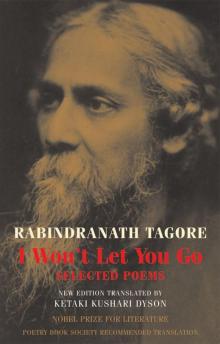 I Won't Let You Go: Selected Poems
I Won't Let You Go: Selected Poems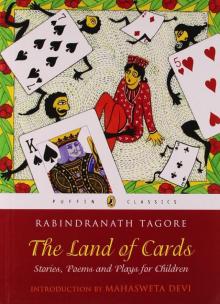 The Land of Cards: Stories, Poems, and Plays for Children
The Land of Cards: Stories, Poems, and Plays for Children The Tagore Omnibus, Volume One
The Tagore Omnibus, Volume One The Boat-wreck
The Boat-wreck Chokher Bali
Chokher Bali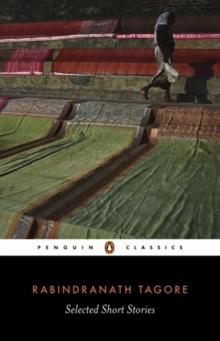 Selected Short Stories
Selected Short Stories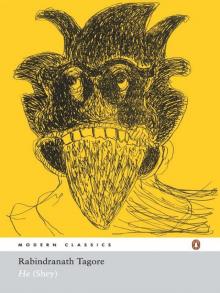 He (Shey)
He (Shey) Letters From a Young Poet 1887 1895
Letters From a Young Poet 1887 1895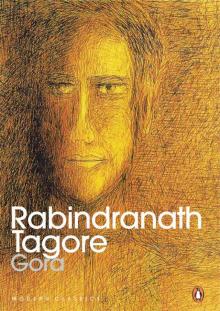 Gora
Gora Tagore Omnibus, Volume 1
Tagore Omnibus, Volume 1 Selected Poems (Tagore, Rabindranath)
Selected Poems (Tagore, Rabindranath)